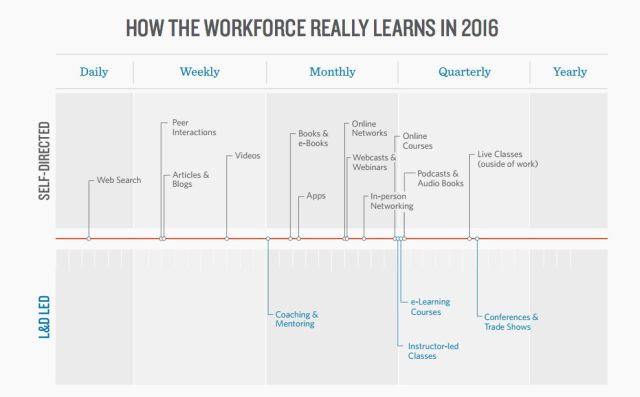
Why employees are mostly training themselves
Employees get 1% of their working week to focus on training and development.
Yet, we live in a culture where companies look to hire “learning animals”.
The perfect employee has the smarts to handle massive change and the character to love it.
IBM found that when deprived of advancement opportunities, learning animals were 12 times more likely to leave the reservation.
Still, most HR professionals admit workers aren’t turning to them for learning.
Even though 35% of millennials regard training and development as one of the top company benefits.
Why?
Fit to Learn
Most companies’ training programs fail, according to a Degreed report last year.
Forget massive once- or twice-yearly training events, Degreed CEO David Blake suggests.
Most training experts agree that this only exposes the person to the material.
It’s not “training”.
Training requires ongoing exposure in order to learn.
Then ongoing assessment, testing the knowledge gained.
Think of training more like “learning fitness“.
In an ongoing, gradual process, companies would send ongoing check-in notifications to employees.
(Like mobile apps.)
David Blake suggests this tweaking would foster employee loyalty and increase productivity.
There are companies trying innovative learning strategies like learning sabbaticals.
But most employees train themselves.
Workers now have plenty of resources to choose from for self-improvement:
Making the most of your limited learning time
How do you pick and choose what skills to learn when?
A 2×2 matrix via Harvard Business Review may help prioritize the skills you need right now.
“Time” is time to learn.
“Utility” is how much you’re likely to use the desired skill.
Group the skills on your list as either low or high in utility and time to learn.
Then place them in the matching square.
What shows up in the bottom-right corner?
You may discover some learning wins.
Very useful, particularly if your job is: travel agent, meter reader, flight attendant, lumberjack, librarian or newspaper reporter.
These are the jobs reported by SHRM last year as being the most endangered by automation.




You must be logged in to post a comment.